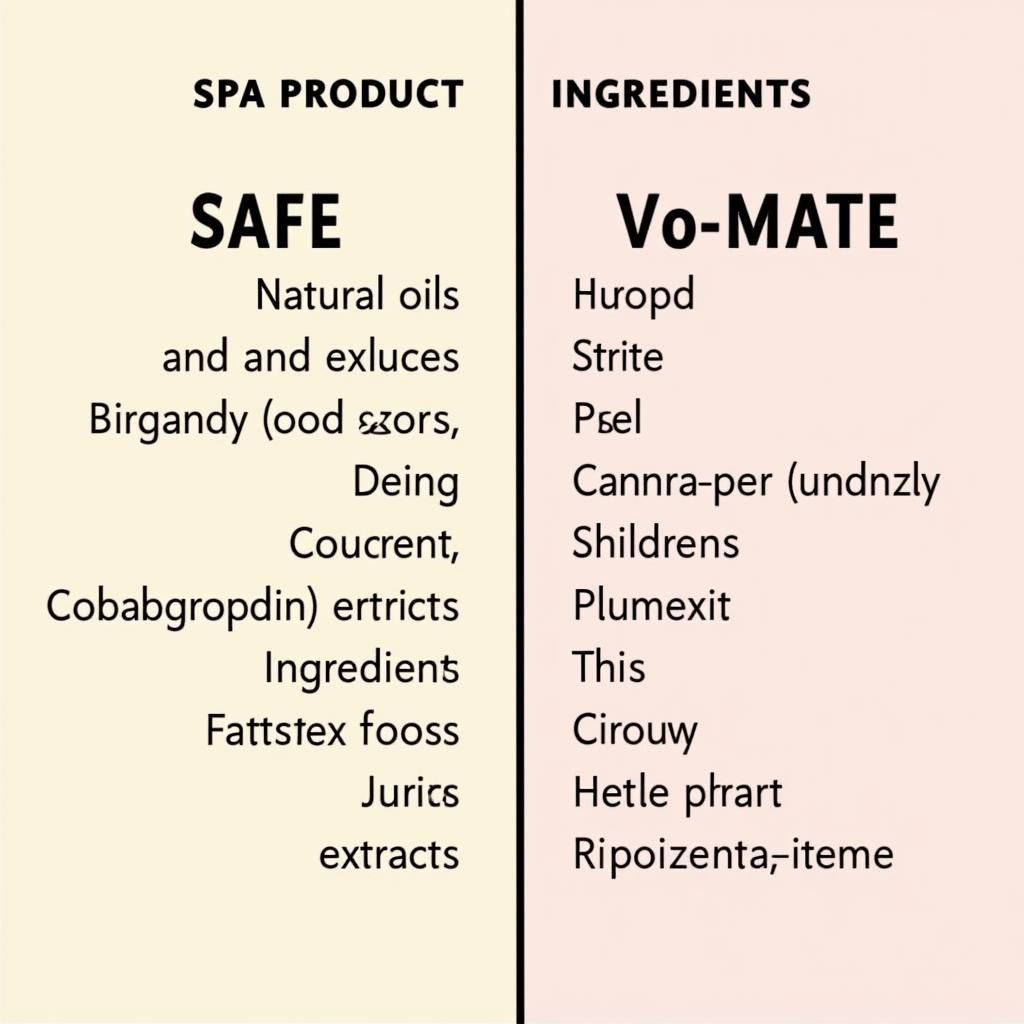Spa treatments promise relaxation and rejuvenation, but what about the spa chemicals used? Understanding these ingredients is crucial for a safe and truly beneficial spa experience. This review dives into common spa chemicals, exploring their benefits, potential risks, and how to choose products wisely.
Unmasking Common Spa Chemicals
From soothing lotions to invigorating scrubs, spa products contain a mix of chemicals. While “chemical” often carries a negative connotation, many are perfectly safe and contribute to the desired effects. Let’s break down some common categories:
- Surfactants: These create the lather in cleansers and shampoos. While effective, some like sodium lauryl sulfate (SLS) can be harsh, stripping natural oils. Gentler alternatives include cocamidopropyl betaine and glucosides.
- Preservatives: These prevent bacterial growth and extend product shelf life. Parabens are a common type but have raised concerns about potential health risks. Look for products using natural preservatives like grapefruit seed extract or phenoxyethanol.
- Fragrances: These add appealing scents but can be irritating for sensitive skin. Opt for products with natural fragrances from essential oils or fragrance-free options.
- Emollients: These moisturize and soften the skin. Common examples include mineral oil, shea butter, and various plant-based oils. Consider your skin type when choosing an emollient. If you have oily skin, lighter oils like jojoba or grapeseed might be preferred. Those with dry skin might benefit from richer options like shea butter or coconut oil.
- Exfoliants: These remove dead skin cells, revealing smoother skin. Physical exfoliants like sugar or salt scrubs can be abrasive, while chemical exfoliants like alpha-hydroxy acids (AHAs) can be more gentle.
Are Spa Chemicals Harmful?
Not all spa chemicals are created equal. Some, like certain preservatives and fragrances, have been linked to potential health concerns, while others are generally considered safe.  Safe and Harmful Spa Chemicals Doing your research and understanding the ingredients list is key to avoiding adverse reactions.
Safe and Harmful Spa Chemicals Doing your research and understanding the ingredients list is key to avoiding adverse reactions.
Choosing Safe and Effective Spa Products: A How-to Guide
- Read the Label: Don’t be intimidated by long chemical names. Take the time to research unfamiliar ingredients.
- Patch Test: Before applying a new product all over, test it on a small area of skin to check for any reactions.
- Know Your Skin Type: Choose products formulated for your specific skin type, whether it’s oily, dry, sensitive, or combination.
- Consider Your Concerns: Are you looking for anti-aging benefits, acne treatment, or simply hydration? Choose products that target your specific concerns.
- Opt for Natural When Possible: Look for products that utilize natural ingredients and avoid potentially harmful chemicals. A natural spa experience often prioritizes organic and naturally derived ingredients.
- Consider an above ground spa pool for a private and controlled spa experience.
What are the Most Common Spa Chemicals?
Some of the most frequently encountered spa chemicals include sodium lauryl sulfate, parabens, mineral oil, and various fragrances. While some of these can be irritating, many are considered safe for most people.
How Can I Identify Harmful Spa Chemicals?
Harmful spa chemicals can be tricky to identify, but resources like the Environmental Working Group’s Skin Deep database can help. This database provides safety ratings for various cosmetic ingredients. You can also learn how to make spa salt at home using natural ingredients.
Spa Chemicals: The Bottom Line
Understanding spa chemicals is empowering. By being an informed consumer, you can choose products that enhance your spa experience without compromising your health.
FAQ
- Are all spa chemicals bad? No, many spa chemicals are safe and contribute to the effectiveness of the products.
- How can I avoid harmful spa chemicals? Read labels carefully, patch test new products, and research unfamiliar ingredients.
- What are some natural alternatives to common spa chemicals? Natural preservatives include grapefruit seed extract, while gentler surfactants include cocamidopropyl betaine.
- Where can I find more information on spa chemical safety? Resources like the Environmental Working Group’s Skin Deep database provide safety ratings for cosmetic ingredients.
- What should I do if I have a reaction to a spa product? Discontinue use immediately and consult a dermatologist if necessary.
- What are some common irritants in spa products? Fragrances and certain preservatives are common irritants.
- How can I choose spa products for my skin type? Look for products specifically formulated for oily, dry, sensitive, or combination skin.
Perhaps you might be interested in exploring the services at our sparkle car spa or researching options at a green unisex salon and spa ahmedabad Informational, Transactional.
Need more help with Spa Chemicals Review? Contact us! Phone: 0373298888, Email: [email protected], Address: 86 Cầu Giấy, Hà Nội. We’re available 24/7.